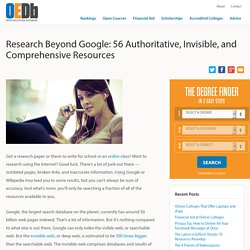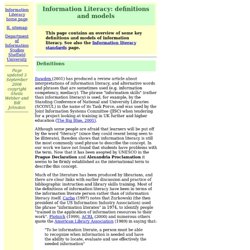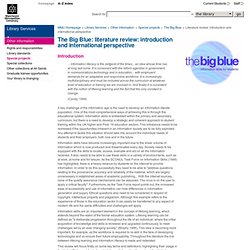

158723e.pdf (application/pdf Object) Information Retrieval - Rationale. Research Beyond Google: 119 Authoritative, Invisible, and Compre. Got a research paper or thesis to write for school or an online class?

Want to research using the Internet? Good luck. There’s a lot of junk out there — outdated pages, broken links, and inaccurate information. Using Google or Wikipedia may lead you to some results, but you can’t always be sure of accuracy. And what’s more, you’ll only be searching a fraction of all of the resources available to you. Google, the largest search database on the planet, currently has around 50 billion web pages indexed. Do you think your local or university librarian uses Google? Topics Covered in this Article Deep Web Search Engines | Art | Books Online | Business | Consumer | Economic and Job Data | Finance and Investing | General Research | Government Data | International | Law and Politics | Library of Congress | Medical and Health | STEM | Transportation Deep Web Search Engines To get started, try using a search engine that specializes in scouring the invisible web for results.
Art Books Online Business. Information Literacy: definitions and models. Bawden (2001) has produced a review article about interpretations of information literacy, and alternative words and phrases that are sometimes used (e.g. information competency, mediacy).

The phrase "information skills" (rather than information literacy) is used, for example, by the Standing Conference of National and University Libraries (SCONUL) in the name of its Task Force, and was used by the Joint Information Systems Committee (JISC) when tendering for a project looking at training in UK further and higher education ( The Big Blue, 2001) . Although some people are afraid that learners will be put off by the word "literacy" (since they could resent being seen to be illiterate), Bawden shows that information literacy is still the most commonly used phrase to describe the concept. In our work we have not found that students have problems with the term. Other definitions of the information literate person tend to cover the same elements, but expand on them in one way or another. InfoLit-Literature-Review.pdf (application/pdf Object)
MMU - Library - The Big Blue - literature review: introduction a. Introduction ... information literacy is the zeitgeist of the times... an idea whose time has at long last come.

It is consonant with the reform agendas in government, in communications technology and in education... with employers' demands for an adaptable and responsive workforce. It is increasingly multidisciplinary and must be included across the curriculum at whatever level of education or training we are involved in. And finally it is consistent with the notion of lifelong learning and the fact that the only constant is change.
(Candy, 1996) A key challenge of the information age is the need to develop an information literate population. Information skills have become increasingly important due to the sheer volume of information which is now produced and disseminated every day. Information skills are an important element in the concept of lifelong learning, which extends beyond the realm of the formal education system. Key terms: Information literacy or information skills? Australia.